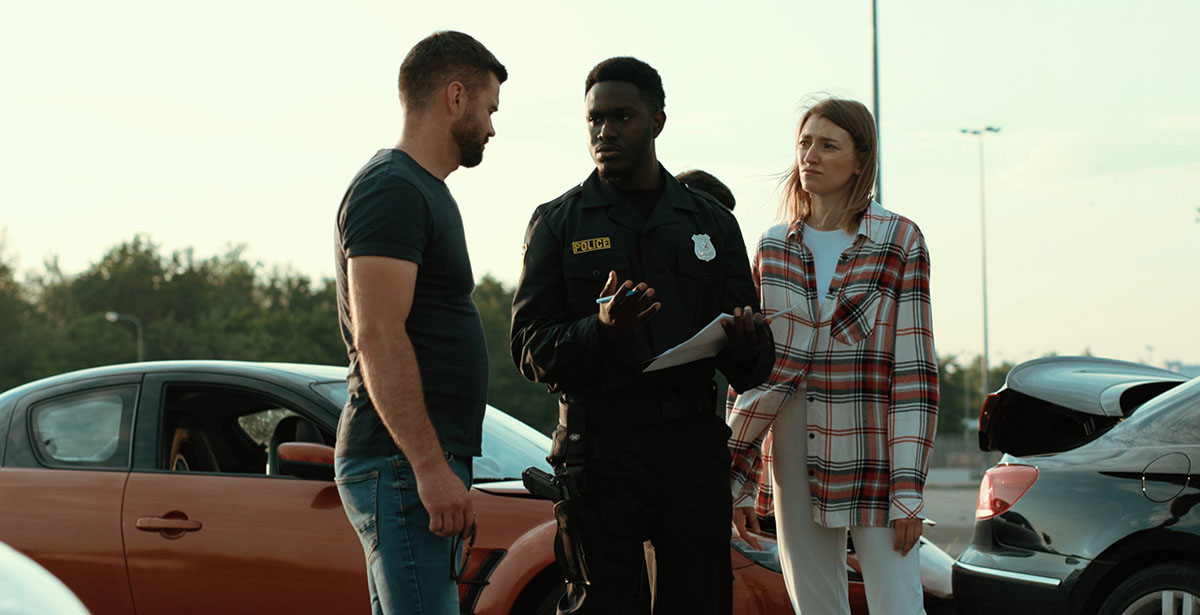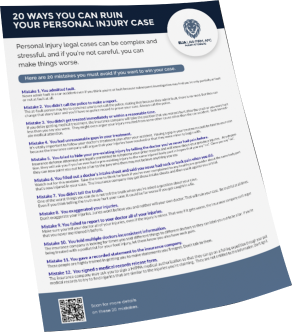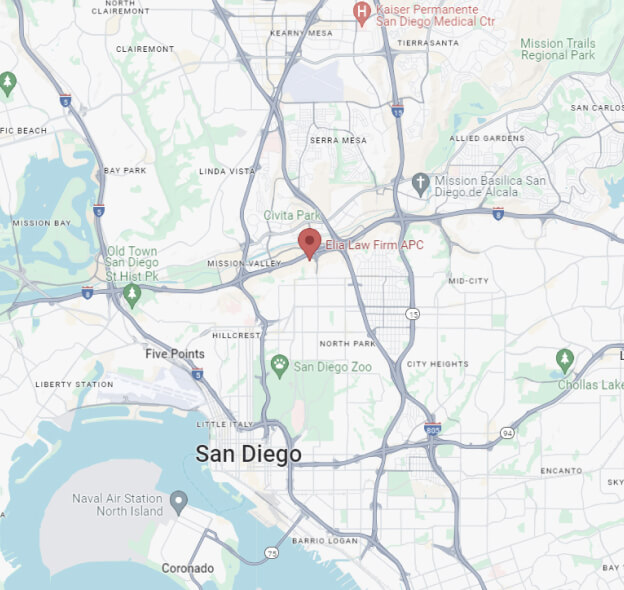
- About
- Personal Injury
PERSONAL INJURY
PRACTICE AREAS INVOLVING
MOTOR VEHICLESOTHER PRACTICE AREAS
 20 Ways to Ruin Your Personal Injury Case
20 Ways to Ruin Your Personal Injury Case - Business Law
BUSINESS LAW
ADDITIONAL INFO
- Civil Litigation
Civil Litigation Services & Info

Personal injury legal cases can be complex and stressful, and if you’re not careful, you can make things worse and greatly harm your chances of winning your case. In this guide, we will discuss 20 things you should avoid doing and thus increase your chances of a successful outcome and winning your case.
Remember to consult with an experienced personal injury attorney like those here at the Elia Law Firm to ensure your rights are protected.
Never admit fault in a car or any other kind of accident even if you think you’re at fault because subsequent investigation may find you only partially at fault or not at fault at all.
In the case of motor vehicle accidents, in many instances the at-fault driver will try to convince you not to call the police. The at-fault driver may even tell you he or she is at fault and his or her insurance company will pay for everything. You then trust that person and don’t call the police. The at-fault driver then calls his or her insurance company and says you were completely at fault. Now you don’t have a police report with an investigation into what caused the accident and a decision as to who was at fault. You’ve now given the at-fault driver’s insurance company a reason to deny your claim or, at least, offer you much less money on your claim.

After a car or other motor vehicle accident, including pedestrian accidents, if you’re able to photograph the evidence, you should. For instance, if there are shards of glass from a headlight that were in the number two lane, take a photo of the shards which shows they are in the number two lane. This way, if the at-fault driver argues you came into his number one lane and crashed into him, you’ve got the evidence to prove otherwise.
The same holds true for slip and fall and other premise liability cases, construction accidents, and even dog bites. Get pictures of the surroundings and anything that might have caused the accident and your injury because they may change later and then you lost some important evidence.
Also, many car accident victims sustain bruises over their bodies which should be photographed and preserved as evidence. This is especially important in minor impact cases where the insurance company argues your injury is a soft tissue whiplash injury. The bruising shows the severity of the trauma to the injured area.
If you make one or more of the above-mentioned mistakes before you hire a personal injury lawyer, these mistakes could significantly devalue your case. Insurance adjusters and their attorneys are trained to evaluate claims. Remember, insurance companies are not in business to pay you compensation, their goal is to maximize profits for their shareholders. You might be offered offer a quick settlement in exchange for a written release that closes your case. The offer is usually far less than what your case is worth because they don’t want you to hire an attorney so that they can pay you less money for your injuries.
An experienced personal injury attorney is in a better position to evaluate, handle and negotiate your case on your behalf. In many instances, certain laws apply when you hire a lawyer that allow you to substantially reduce your medical bills and save you money. If you’re looking to hire a lawyer for your personal injury case, contact me or give me a call and I’ll meet with you one on one to give you honest and accurate advice.
One of the biggest mistake you can make after a car accident is not going to see a doctor immediately. It’s very important to seek prompt medical attention, not only for your health and well-being, but also to document your injuries as soon as possible. If you delay getting medical treatment, it could be devastating to your case because the insurance company will take the position that you weren’t hurt after the crash or you were hurt less than you say you were. They might even argue your injury resulted from some other cause other than the car accident. Don’t let the insurance company diminish your claim or try to shift the cause of your injuries. Seek immediate medical attention.
If you don’t have a doctor, we can provide you with a list of doctors we work with in San Diego and surrounding areas who will treat you right away without you paying until the end of the case. That means you could get immediate medical care for your injuries and the doctor will be paid at the end of your case from the proceeds of your settlement.
It’s vitally important to follow your doctor’s recommendations and treatment plan after your car accident. Having a gap in your treatment could be fatal to your case because the insurance company will argue that your injuries have resolved once you stopped treating, or that they were minor to begin with because you weren’t following your own doctor’s treatment plan. If some event happens in your life where you must take a break from treatment, such as a death in the family or a vacation, make sure you let your doctor know so that he can document your file so that you have an explanation for the gap in treatment. Then resume with your medical care as soon as you can.

This is one of the most common traps people fall into when trying to make an auto accident injury claim. Some people don’t remember having previous injuries, while others think they can outsmart the insurance company or the defense attorney. Both always fail miserably. Insurance companies share information and have databases that know if you’ve been injured in previous accidents. Insurance defense attorneys are legally permitted to subpoena your prior records and will know about your previous injuries. At a deposition, they will ask you if you’ve ever had a pre-existing injury to the same body part that is now injured in hopes that you say “no”. Once you say “no”, they can now paint you out to be a liar to the jury. CACI jury instruction number 107 is an instruction the jury will hear. It says “However, if you decide that a witness did not tell the truth about something important, you may choose not to believe anything that witness said.” If you are caught in a lie, a savvy insurance attorney is going to argue to the jury that they should disregard your entire testimony.
Watch out for this mistake. Take the time to think far back if you’ve ever complained to any healthcare provider about the same body part that’s now injured in your case. The insurance company may get these intake sheets and then use it against you at trial.
Here’s how the cross examination may go.
“Ms. Doe, do you remember filling out the intake sheet at Dr. Smith’s office?”
“Yes.”
“This is your signature on the intake form, true?”
“Yes.”
“You were asked if you had any pre-existing injuries to your neck, true?”
“Yes.”
“And you answered ‘No’, true?”
“Yes.”
“That wasn’t a true statement was it?”
“No.”
Now they’ve made you out to be untruthful. And that is devastating to a jury.
If you don’t tell the doctor all of your injuries, the doctor’s report will not mention all of your injuries which makes it very difficult to prove your unmentioned body part was injured in the accident.
Here’s what the cross examination at trial may look like.
“Ms. Doe, you treated with Dr. Smith for your back injuries?”
“Yes.”
“When you saw Dr. Smith two days after the accident, isn’t it true you never complained of neck pain?”
“Yes.”
How bad does this look that you didn’t tell the doctor you had neck pain? It’s devastating! Make sure you tell your doctor all of your injuries, even if the injury is minor, so at least you document the injury and so that if it gets worse, the insurance company can’t argue that you never mentioned it before.
Remember that the insurance company is looking to find ways to attack your truthfulness. They are looking for you to say different things to different doctors at different times so they can label you out to be a liar. Try to be consistent with all of your doctors. If you’re treating with a podiatrist for your foot injury, let them know you also have neck pain.
Don’t exaggerate your injuries. Juries won’t believe you and neither will your own doctor. That will ruin your case. Be truthful at all times.

One of the worst things you can do is not tell the truth when your asked a question about your case. Remember, the way the insurance company will attack you is to make it look like you’re not telling the truth. They do this because they know jurors don’t like to award compensation to someone who isn’t truthful. Even if you think telling the truth may hurt your case, it could be far worse if you get caught in a lie. Your credibility at every stage of your case is crucial to a successful outcome.
The at-fault driver’s insurance company may call you after the accident and ask you to give a recorded statement. They want a recorded statement for several reasons.
First, if fault is at issue, they may get you to make a statement that supports their position that you caused the accident.
Second, if fault is not at issue, they want to pin you down on your statements about your injuries. Let me give you an example.
Suppose Jane is involved in a not so uncommon rear-end auto accident on Interstate 15 in San Diego on January 1 and injured her neck and back. The next day, on January 2, an adjuster calls her to take her recorded statement. During the recorded statement, the adjuster asks Jane to state all of her injuries. Jane’s back hurts much more than her neck so she says ”I’ve got bad back pain”. The adjuster then asks Jane to rate her back pain on a scale of 1 to 10. Jane says “it’s a 5 out of 10″. The adjuster then asks, “Have you told me about all of your injuries?” Jane says “yes”. Then, a week later, Jane neck pain gets worse and she notices she’s got shooting pain (now an 8 out of 10) running from her lower back down to her right leg.
If the case goes to court, here’s what the insurance defense attorney will likely argue to the jury. “Ladies and gentlemen, we asked Jane in a recorded statement the very next day if she had any injuries from the accident. She told us that she had back pain and the level of her back pain was a 3 out of 10. When we asked her if she had any other injuries, she said no. She never told us about any neck pain or any pain running down her right leg and now she claims it’s an 8 out of 10.”
The defense attorney will make Jane out to be an exaggerating liar who sees this as an opportunity to make money.
All this could have been avoided if Jane simply didn’t give a recorded statement.
During your case, there will be several instances when you make statements about your case. You might make a statement to the police at the scene. You might give a recorded statement to the insurance company. Each time you treat with a doctor, you make a statement about your injuries. If you file a lawsuit, they may take your deposition and you will make statements during the deposition. The insurance company has the right to send you to their doctor to be examined prior to trial who will take your history. If the case proceeds to trial, you will take the stand and make statements. During all these times you make statements, the insurance company will be looking for inconsistent statements you’ve made so that they could argue to the jury that you’re not being truthful and that they should disregard your entire testimony. In fact, there’s even a California Jury Instruction (CACI 107) which says “However, if you decide that a witness did not tell the truth about something important, you may choose not to believe anything that witness said.”
Beware if a friendly insurance adjuster calls you after an accident. These people are highly trained and you should never speak to them. In California, you’re not under any legal obligation to give the other driver’s insurance company a recorded statement, so don’t do it.
At our office, our attorneys control the information the insurance adjuster receives and we give them only what we want them to see.
The insurance company may ask you to sign a HIPPA medical authorization which would allow them to get copies of your confidential medical records so that they can go on a fishing expedition through your past medical records to try to find injuries that are similar to the injuries you’re claiming were caused by the accident so they can argue your injuries were pre-existing and not caused by this car accident. They are not entitled to this information.
Here’s an example. Suppose Jane saw her doctor six months before her accident because she slept wrong and had some back pain. The doctor’s report from six months ago states “Patient complains of lower back pain”, but doesn’t mention anything about the cause which was that Jane just slept on it wrong. Six months later, Jane is rear ended in an auto accident and complains of lower back pain. If the insurance company gets Jane’s previous records, they will argue the car accident didn’t cause Jane’s lower back pain, that it was a preexisting injury evidenced by a doctors report six months before the accident.
This is another way they diminish your claim so don’t sign any paperwork that the insurance company gives you.
Prior California law required insurance companies to pay your gross health insurance medical charges. Currently, California law allows insurance companies to pay only your health insurance net charges. You are under no obligation to do the insurance companies homework and provide them your health insurance net charges.

Insurance companies love reading your posts on social media sites. Posting “I had the best day of my life” on social media while you claim in your lawsuit that you suffer from constant depression resulting from the car accident is an example of a contradictory statement that can wreck your entire case.
Insurance companies especially like looking at your vacation photos showing you doing a strenuous activity that you claim your injuries have restricted you from doing such as skiing, swimming or maybe hiking. They might take such a photo, enlarge it and show it to a jury which can make you look bad. Be careful of what you post on the internet.
People either forget they were involved in a car accident because it happened long ago or think that if they say they were in a previous accident, it will hurt their case. Insurance companies all share information about who’s been in auto accidents that you were involved in in the past, so if you’re asked if you’ve been in a previous accident, tell the truth. They already know the answer and they’re hoping you say no so that they can attack your credibility and diminish your case.
There are time limits which apply to bring a lawsuit. In California, absent certain exceptions, you have a two-year statute of limitation to file a lawsuit against the at-fault driver. If you delay beyond two years, you may be time barred and forever lose your rights to bring a claim.
There will be many opportunities throughout your case where you will make statements. Maybe you gave a recorded statement before you hired a lawyer for your car accident case. Every time you saw a doctor you gave a statement about your injuries that will be documented in your records. You may even have your deposition taken where you’ll be asked many questions under oath. You may be required to be evaluated by a doctor hired by the insurance company who will take a history of you by asking you many questions which will then be recorded into a medical report. Finally, if your case goes to trial, you’ll make even more statements if you testify before a jury. Think about all the statements you’ve made about your injuries and your case. The lawyer for the insurance company will look for any inconsistencies you made at every stage and point those out to a jury and argue that you weren’t being truthful because your statements were inconsistent. Make sure that you keep in mind that every time you make a statement, whether it’s to your doctor or someone else, that you’re being consistent.
Go back and read #4 again. Failure to contact a personal injury attorney as soon as possible can end in grief with you not getting anywhere near the compensation you deserve, if any at all. A good personal injury attorney will advise you on how to win your case. They also know how to win the battle against your adversary the insurance company, and will step in on your behalf so you don’t have to talk to them at all. And they know the real value of your case and will fight hard for a winning outcome to ensure you get what you need to back to living the life you had before your accident.
So what are you waiting for? If you’ve been injured in an accident through no fault of your own in San Diego County or anywhere in the state of California, call now for a free consultation and find out what your case is worth. There is no fee until we win.




We serve accident victims in San Diego, Escondido, Oceanside, El Cajon, Poway, La Jolla, Del Mar, Chula Vista, and all other towns and cities in San Diego County and beyond


Elia Law © 2024 All rights reserved. | Disclaimer | Privacy Policy | Site Map
Elia Law © 2025 All rights reserved. | Disclaimer | Privacy Policy | Site Map